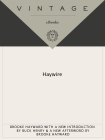Haywire by Brooke Hayward (book club books .txt) 📗

- Author: Brooke Hayward
Book online «Haywire by Brooke Hayward (book club books .txt) 📗». Author Brooke Hayward
We lived at 12928 Evanston Street for the first seven years of my life. Although I was able to recall in detail what Mother wore on my first birthday, Bridget’s arrival, in 1939, when I was one and a half, always drew a blank. Father and Mother used to tell us that when they brought her home from the hospital and up to the nursery for my inspection, I gathered my forces for a long instant, reached murderously into the bassinet, and pinched her with all my strength, then, for the next six months, did not speak to either Mother or Father or allow them to touch me. Father said pensively he would follow me through the garden and try to take my hand, but I would snatch it away without saying a word. After a lot of sulking, I rejoined the family.
Bridget was a sensational baby. She had almost white hair and double-jointed hands like Mother; she could stick her fingers out so that they would all remain straight until the last joint, which she would crook without bending the rest of the joints along the way. When she learned to play the piano, the tips of her otherwise horizontal fingers were bent at right angles to the keyboard; watching her play the piano was something like watching the Chico Marx routine with trick fingers, in which he’d point at a piano key and shoot it, touching it as he shot. As a baby, she would lie grinning from ear to ear in her crib, one foot through the bars, while our dog sat on the outside licking her toes. Her hair was so white it didn’t look quite real, nor did her complexion, which was so fair I always supposed—or wished—I could see through the transparent layers of skin and blood vessels and muscle to the center of her being. Bridget’s eyes were bluer even than Father’s, the color of irises before they’ve been open very long to the sun-cornflowers, said Mother, and called her “my little white mouse,” but I called her Brie, because I couldn’t pronounce Bridget, and that became her name to us. Nobody else in the family had ever had hair that color. “Oh, Bridget,” people would say to make conversation when she was learning to talk, “where in the world did you get that hair?” She would fix them with a long solemn look of her blue eyes; then her mouth would turn up at the corners. “God,” she would answer, “God.” She was light-boned, easy to pick up, and so delicate I used to worry that wind might blow her over; the bluish tinge just below the surface of her skin gave the illusion that she was just slightly bruised.
“She was an original,” said Bill Wright. “There was a fey quality of Irish fairy tales about her. You were a pretty baby, Brooke, much prettier than she was, but she had a strange quality—she had Maggie squared or cubed in her.”
We used to see Bill and Greta Wright practically every day. Either they’d come over for a swim or we’d skip across the street to see if we could tempt their dogs to bark at us. Next to their house was a vacant lot, which we turned into a communal vegetable garden; we supplied the manpower in the person of George Stearns, our cigar-smoking chauffeur, and Bill Wright supplied the water from his nearby hose. For days, Bridget and I followed George and his cigar through the rows of corn, copying every move, examining handfuls of corn silk, poking at dusty summer squashes, and squealing when he picked the first ripe watermelon, which he held dramatically above his head and dropped on a sharp rock so that red pulp splattered all over us and we licked it off each other. George lived in an apartment over our garage. Elsa and Otto, the German cook and butler, lived there, too. Father used to say that Elsa was a bum cook but he could never part with her because she could make two things better than anybody else: scrambled eggs and flower arrangements. Otto’s moment of glory came every Halloween when he disappeared to engineer his gigantic pumpkin extravaganzas, meticulously decorated with contrasting faces of prunes and popcorn, corn from the garden and its silk (for hair), gourds, and sprays of asters and chrysanthemums.
We had many nurses over the years, but the only two we ever cared about were the first and the last: Miss Mullens, who came when Bridget was born, and Emily Buck, who came when I was five and stayed for six years. Miss Mullens toilet-trained us on an antique china potty, kept under the bed. She wore a starched white uniform and white polished shoes, but Emily refused to wear anything but baggy old blue jeans (except on her day off, when she wore a plaid cotton dress that smelled of Clorox).
Mother loved house-hunting. She would go house-hunting at the drop of a hat. Any excuse would do. On the way to the hospital in acute labor the morning I was born, she begged Father and Martha Edens (our godmother) to stop the car because she saw a “For Sale” sign somewhere along





Comments (0)